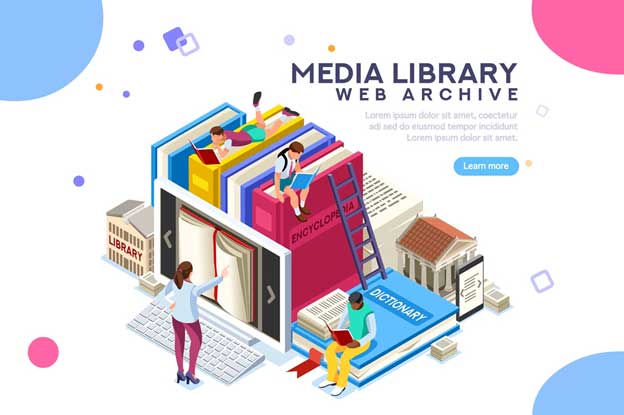With the increasing demand for technical services in libraries, there is also a higher demand in the skills and capabilities of the librarians to provide these services.
Despite seemingly limited career opportunities in librarianship in the digital age, the profession and its practitioners have shown resilience by evolving with the times. Venturing into teaching, data management, and open access are just some of the responses. These skills can be learned in universities such as the University of Southern California or even by attending online lessons.
The following is a compilation of technical jobs, based on the latest technological advancements, that you can apply for after finishing a Library Science degree:
1. Electronic Resource Librarian
Traditional librarian roles focus on specialist subject inquiry services and research support. But the changing landscape has forced libraries to adjust by expanding the number of technical services that they can provide, while still serving the needs of traditional library users.
Some libraries may hire robots to man their libraries, but tasks for online libraries are offered to Library Science degree holders.
The increase in demand for access to publishers’ database, e-books, and full-text journals has created electronic resource (ER) roles in allowing users to access the electronic contents of libraries, organizing, and selecting. To manage listings of e‐journals, an ER librarian uses ERMS (electronic resource management systems).
The functions of an ER librarian could include:
- Acquiring, evaluating, licensing e‐resources
- Managing, maintaining, troubleshooting
- Organizing through cataloging or electronic resource management
General competencies such as reference and instruction are expected, while professional capabilities such as communication, working collaboratively, and problem-solving are commonly listed as actual requirements.
As an ER specialist, you can also provide innovative information searches through the following services:
- Online Research Service (or ‘ask a librarian’): As a reference librarian, your expertise can be shared to provide authoritative websites and other online resources that will assist in research. Using this service, users can pose questions online, which you, as an ER specialist, can directly answer through chat messaging.
- Lecture/Tutorial on the Use of Library Technologies: You can teach users about e-borrowing and how to use handheld digital reading devices such as smartphones or tablet computers. Some libraries provide workforce development programs to assist job-seekers with important employment resources and teach them how to use employment databases and online applications.
- Search Engine for Book Recommendations: An ER librarian can develop a local network search engine that will provide users with library catalog data, combined with book reviews, from library staff and client behavior patterns.
2. Digital Librarian
Digital library (DL) services were deemed necessary because of the demand for the accessibility of digitized library resources. While ER roles show more traditional library work, DL workers deliver digital information through technology-based projects in a digital library.

Digital librarianship is a new and upcoming line of careers for those with a Library Science degree. (Source: Public Domain)
The required competencies for a digital librarian are technical knowledge, such as familiarity with current trends and an understanding of the internet. As a DL, you must also have experience in integrated library science. In addition, this job may require expertise in specialist IT and information knowledge, including skills in digital collection management and web design.
As a DL specialist, you can also develop the following innovative services:
- Virtual Reality/Access through Mobile Apps: A DL can create mobile apps and use virtual reality to enable users to access services or materials. These apps can extend the library’s services outside their physical borders and facilitate user interaction. An app that can offer various functions, such as a library catalog, interactive guides, virtual tours, GPS-based navigation, and a calendar of a library’s events, is one of the innovative ideas that DL specialists can develop. Going the extra mile, individuals in this role can also develop applications that make it possible for users to borrow and read e-books and articles, to reserve the library’s resources, or to pay for certain services. The possibilities are endless, for the benefit of library patrons.
- Digital Storytelling: It is now a trend where readers become immersed in and control the narrative flow of stories through interactive storytelling. Libraries are working with writers and coders, as well as developers and gamers, with a passion for interactive storytelling to create these stories.
3. Institutional Repository Manager
Publicly-funded research outputs’ accessibility should be changed, and therefore, the establishment of global open-access for the accessibility of such research or reports. These materials can be accessed when publications deposit their research into public archives or repositories. As a result of the emergence of open repositories, institutional repository (IR) managers are now in demand.
The skill sets of an IR include management skills, knowledge of relevant software, library‐related knowledge around metadata, storage and preservation, intellectual property rights, and knowledge of the scholarly publishing cycle.
Conclusion
The modern-day careers that you can pursue with a Library Science degree are vast, especially since the curriculum has been adjusted to equip students with the skills necessary for the jobs that the new age of librarianship offers. Also, due to technological advancements, more jobs that may require technical skills await a Library Science degree holder.
Top Image: Library Science degree holders can pursue a variety of evolving career options, apart from traditional librarianship. (Source: Public Domain)







No comment